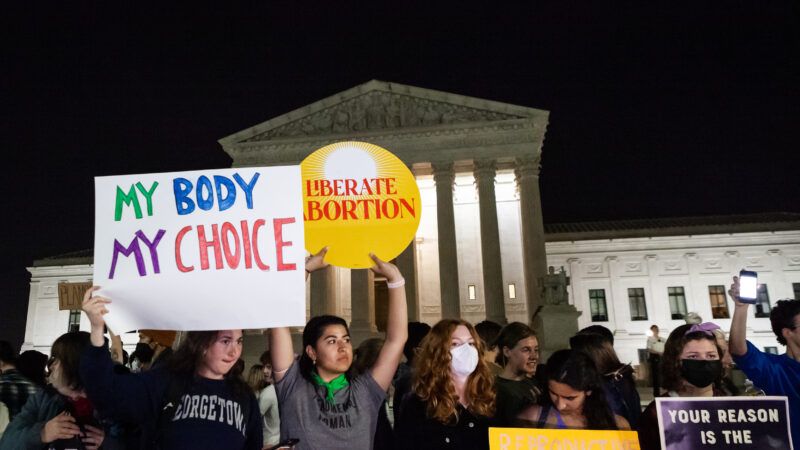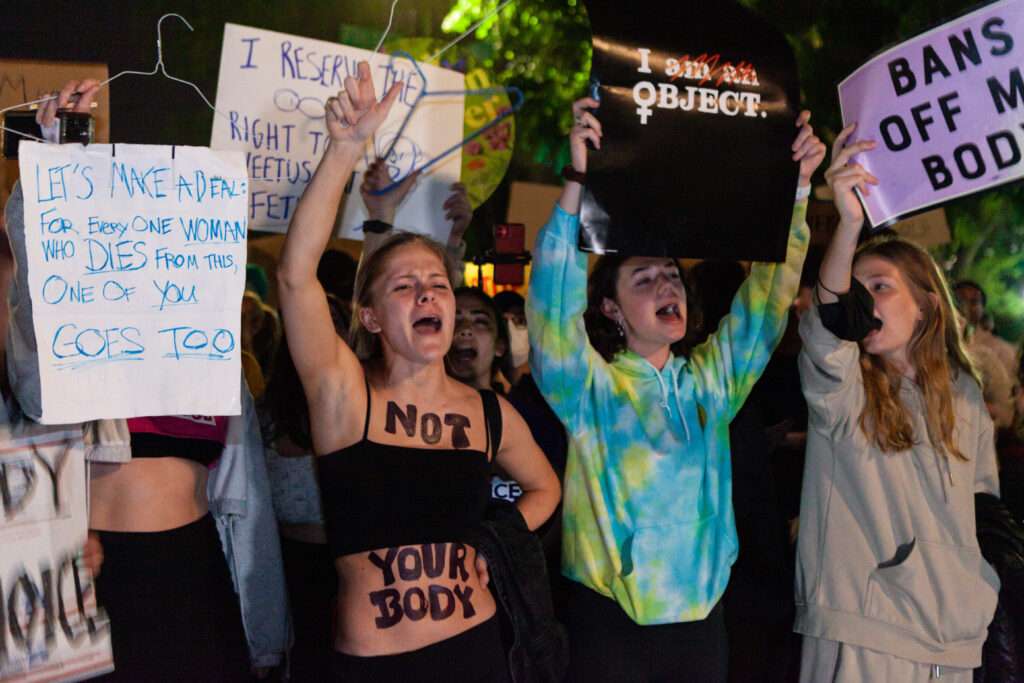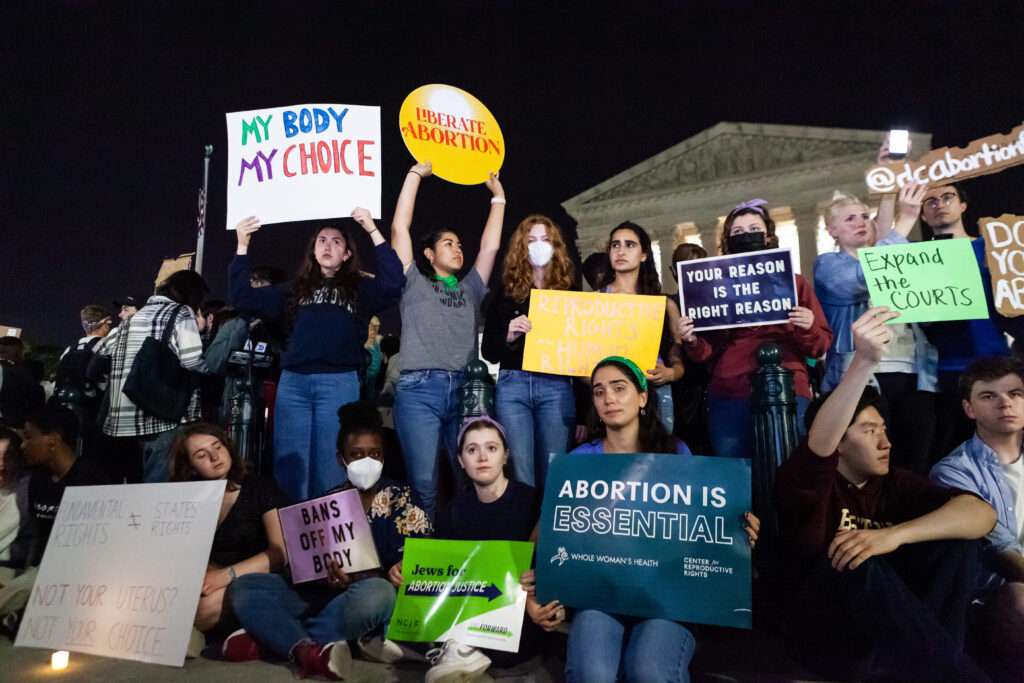The End of Roe? Everything You Need To Know About the Leaked Supreme Court Draft Opinion
Plus: Boston rebuked for rejecting Christian flag, Google will remove more personal information, and more...

"We hold that Roe and Casey must be overruled." Access to legal abortion in America could be severely limited if an alleged draft of a U.S. Supreme Court opinion, leaked to Politico, pans out. The draft opinion—penned by Justice Samuel Alito and dated February 10, 2022—goes much further than many were expecting in a case concerning Mississippi's ban on abortion at 15 weeks.
"It is time to heed the Constitution and return the issue of abortion to the people's elected representatives," Alito writes in the leaked document, labeled "Opinion of the Court."
Oral arguments for the highly watched case (Dobbs v. Jackson Women's Health Organization) were held in December 2021. Many anticipated that the Court will uphold Mississippi's 15-week ban, thus moving the bar backward on the point in pregnancy at which abortion bans are legal. (Previously, courts including the Supreme Court have routinely rejected bans before 20 weeks; the recent Texas law, with its citizen-enforced ban at six weeks, is an anomaly because of the weird way it is structured).
But few expected it to entirely overturn Supreme Court precedent on abortion as enshrined in Roe v Wade (1973) and Planned Parenthood v. Casey (1992).
The leaked draft opinion, however, would set fire to those precedents.
"Roe was egregiously wrong from the start," writes Alito in the document. "We hold that Roe and Casey must be overruled."
"The Constitution makes no reference to abortion," he continues, "and no such right is implicitly protected by any constitutional provision, including the one on which the defenders of Roe and Casey now chiefly rely—the Due Process Clause of the Fourteenth Amendment."
"A person familiar with the court's deliberations said that four of the other Republican-appointed justices—Clarence Thomas, Neil Gorsuch, Brett Kavanaugh and Amy Coney Barrett—had voted with Alito in the conference held among the justices after hearing oral arguments in December, and that line-up remains unchanged as of this week," reports Politico.

Is the document legit? Experts say yes, the document is almost certainly authentic.
But draft opinions do change, and justices do change their minds.
One (perhaps wishful thinking) theory about the draft opinion is that it was leaked to cushion the blow of an eventual 15-week ban by showcasing a more drastic alternative outcome.
But it's also perfectly plausible that the conservative-majority court will indeed back the opinion as written or with only minor modifications.
Note: CJ Roberts has been damnably susceptible to public pressure in the past (hello, NFIB), but if he was already in the minority, this isn't going to change the outcome.
— Gabriel Malor (@gabrielmalor) May 3, 2022
How did it get out? Politico says it "received a copy of the draft opinion from a person familiar with the court's proceedings in the Mississippi case along with other details supporting the authenticity of the document."
There's a lot of speculation—but no firm answers—on why the document was leaked.
Some suggest it was leaked by a liberal law clerk who opposes the ruling and wants to stop it. Others suggest it may have been leaked by a conservative staffer who supports the draft opinion as is and is upset by its subsequent watering down. In either theory, the leaker is presumed to want to change the ultimate opinion with this leak.
It's incredibly rare for a draft opinion to be leaked like this and this leak has been roundly condemned.
Leaking a draft opinion of the Supreme Court destroys trust among the justices and undermines justice. The justices must be able to share their thoughts candidly—and vulnerably—with one another. They are judges deciding cases, not legislators writing laws that need public input.
— Justin Amash (@justinamash) May 3, 2022
What does it mean? If the opinion is issued as-is or somewhere near it, constitutional protection of abortion access will be null and the decision of whether or not to permit abortion will return to the states.
Thirteen states have enacted laws saying that abortion is immediately illegal should Roe be overturned (Arkansas, Idaho, Kentucky, Louisiana, Mississippi, Missouri, North Dakota, Oklahoma, South Dakota, Tennessee, Texas, Utah, and Wyoming). Others retain (currently unenforced) pre-Roe bans that will be triggered again.
Overall, some 23 states "have laws that could be used to restrict the legal status of abortion," according to the Guttmacher Institute. This includes nine states with "unconstitutional post-Roe restrictions that are currently blocked by courts but could be brought back into effect with a court order in Roe's absence."
Meanwhile, other states have passed laws guaranteeing abortion access in Roe's absence, and others are poised to do so. According to the Guttmacher Institute, "16 states and the District of Columbia have laws that protect the right to abortion."
So even if the leaked Alito opinion stands, the Court's ruling in Dobbs v. Jackson Women's Health Organization certainly won't mean the end of abortion access in America. But it will make it much more difficult for women in some areas of the country to terminate a pregnancy.
Of course, systems will spring up to mitigate the effects of state bans and restrictions.

Pre-Roe, when abortion was legal in some states and not in others, networks existed to help women travel out of states with abortion bans in order to terminate a pregnancy. Such networks have already been activating to help women in Texas and other states where abortion access is limited. If Roe is overturned and more states impose hefty restrictions or total bans, such networks would almost certainly ramp up their efforts, helping contain the fallout for women in states with no or limited abortion access. (And employers of people in these states may aid in these endeavors; recently, Amazon and several other companies "have announced plans that ensure staff have access to abortions," notes the BBC.)
But these efforts would be complicated by laws like one passed in Texas and another approved by some lawmakers in Oklahoma, which prohibit assisting someone in obtaining an abortion.
One major difference between now and in the pre-Roe era is the now-widespread availability of abortion-inducing drugs. (The Food and Drug Administration even recently ruled that they can be prescribed by telemedicine.) These drugs make it much easier for women to secretly and safely self-induce abortion—as women in Texas are already doing.
Yet they also set up the possibility of a new war on drugs that induce abortion. Indeed, Texas recently made it a felony to provide abortion-inducing drugs (which are used for other purposes, too) for the purposes of inducing an abortion.
"If you think states can actually prevent medical abortions, you must be unfamiliar with the war on drugs, which has failed for more than a century to stop Americans from obtaining politically disfavored intoxicants, even when they are illegal in every state," notes Reason's Jacob Sullum. But this doesn't mean authorities won't set up a dangerous, invasive, and wasteful system to try.
A post-Roe world. "Without Roe, political battles over abortion will continue, but they will mainly involve state-by-state legislative debates rather than arguments about constitutional law and the composition of the Supreme Court," suggested Sullum in Reason's May 2021 issue. "While neither side will be happy with that situation, it will reduce the stakes of any given legislative or judicial decision and turn down the heat of a controversy that has frequently dominated national politics."
Should federal protection for abortion be obsolete, the best-case scenario for abortion access is that state laws will enable a plethora of different approaches and abortion-travel networks and abortion-inducing drugs will at least help women in no-abortion states.
But conservatives may not be content with abortion only being banned in some states and are likely to keep pressing for a national ban. Indeed, activist networks are already mobilizing to that effect, reports The Washington Post.
"A group of Republican senators has discussed at multiple meetings the possibility of banning abortion at around six weeks," the Post says. "Sen. Joni Ernst (R-Iowa) will introduce the legislation in the Senate, according to an antiabortion advocate with knowledge of the discussions who spoke on the condition of anonymity to discuss internal strategy."
FREE MINDS
Boston violated First Amendment by rejecting Christian flag. In a unanimous ruling released yesterday, the U.S. Supreme Court rebuked Boston for rejecting a request to fly a Christian flag outside its city hall in an area where many community groups were allowed to raise flags. (More background on the case here.) The Court held that this viewpoint-based discrimination violated the group's First Amendment rights.
The city said it was barred from flying religious flags on public property, on the grounds that this would constitute government speech and violate the Establishment Clause. But the Court found that the flags were a kind of public forum, and rejecting only religion-based flags constituted impermissible viewpoint-based discrimination. "When the government encourages diverse expression—say, by creating a forum for debate—the First Amendment prevents it from discriminating against speakers based on their viewpoint," noted Justice Stephen Breyer in the Court's opinion.
The opinion continued:
This case concerns a flagpole outside Boston City Hall. For years, Boston has allowed private groups to request use of the flagpole to raise flags of their choosing. As part of this program, Boston approved hundreds of requests to raise dozens of different flags. The city did not deny a single request to raise a flag until, in 2017, Harold Shurtleff, the director of a group called Camp Constitution, asked to fly a Christian flag. Boston refused. At that time, Boston admits, it had no written policy limiting use of the flagpole based on the content of a flag. The parties dispute whether, on these facts, Boston reserved the pole to fly flags that communicate governmental messages, or instead opened the flagpole for citizens to express their own views. If the former, Boston is free to choose the flags it flies without the constraints of the First Amendment's Free Speech Clause. If the latter, the Free Speech Clause prevents Boston from refusing a flag based on its viewpoint.
We conclude that, on balance, Boston did not make the raising and flying of private groups' flags a form of government speech. That means, in turn, that Boston's refusal to let Shurtleff and Camp Constitution raise their flag based on its religious viewpoint "abridg[ed]" their "freedom of speech."
FREE MARKETS
Google will let people apply to have personal information such as phone numbers, email addresses, and street addresses removed from search results. "The availability of personal contact information online can be jarring—and it can be used in harmful ways, including for unwanted direct contact or even physical harm," Google's Global Policy Lead for Search Michelle Chang wrote in a blog post announcing the change. "And people have given us feedback that they would like the ability to remove this type of information from Search in some cases."
Previously Google would only remove certain types of personal information (such as "in cases of doxxing, or information like bank account or credit card numbers that could be used for financial fraud," Chang writes). The new policy is much more expansive:
Under this new policy expansion, people can now request removals of additional types of information when they find it in Search results, including personal contact information like a phone number, email address, or physical address. The policy also allows for the removal of additional information that may pose a risk for identity theft, such as confidential log-in credentials, when it appears in Search results.
QUICK HITS
• Members of Congress have been briefed on UFOs. "Members of the Senate Intelligence and Armed Services committees received classified progress reports in recent weeks on a series of new data collection efforts the Pentagon and spy agencies are now required to pursue to more rigorously investigate reports of UFOs," reports Politico.
• "The Food and Drug Administration (FDA) is moving fast to close off what seems to be the last remaining legal option for vaping companies that want to provide the e-liquid flavors that former smokers overwhelmingly prefer," reports Sullum. "Exercising regulatory authority that Congress recently gave it, the FDA has set a May 14 deadline for seeking 'premarket' approval of vaping products that deliver nicotine derived from sources other than tobacco. Companies that fail to submit applications by then, the agency warns, 'will be subject to FDA enforcement.'"
• Ohio's Republican Senate primary election—being held today—has highlighted identity problems within the GOP, suggests The New York Times. It has "revealed a party united in its conviction that American values, indeed the nation's way of life, are under attack, but divided on whether to embrace a strict isolationism to address its mounting misgivings about global interconnectedness and American leadership abroad."
• New Department of Education rules about Title IX are expected to be released soon. The controversial changes involve explicitly adding sexual orientation and gender identity to protections under the statute originally passed to prevent sex-based discrimination in education.
• The U.S.-based trucker convoy protesting COVID-19 policies is suing D.C.'s Metropolitan Police Department for blocking access points to the city. The police "formed the blockades for the sole purpose of preventing American citizens from entering our nation's capital to exercise their constitutionally protected right to free speech," they wrote in a complaint filed yesterday.


Show Comments (533)